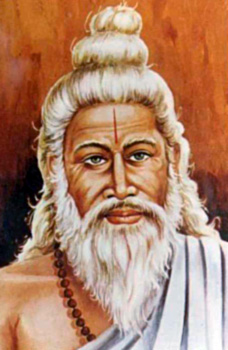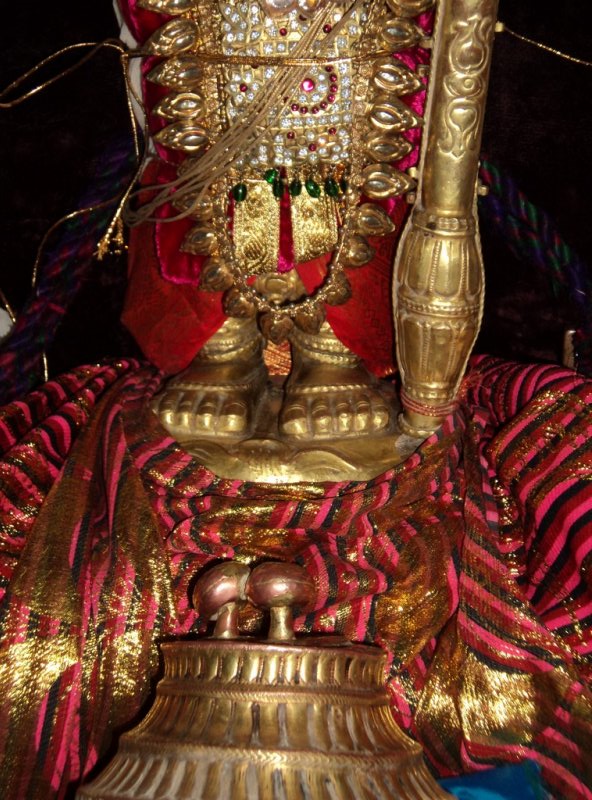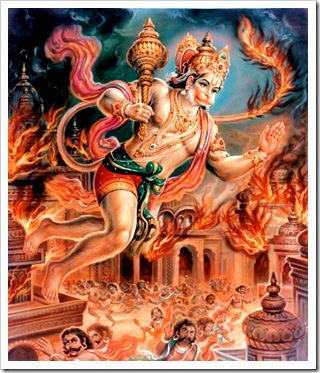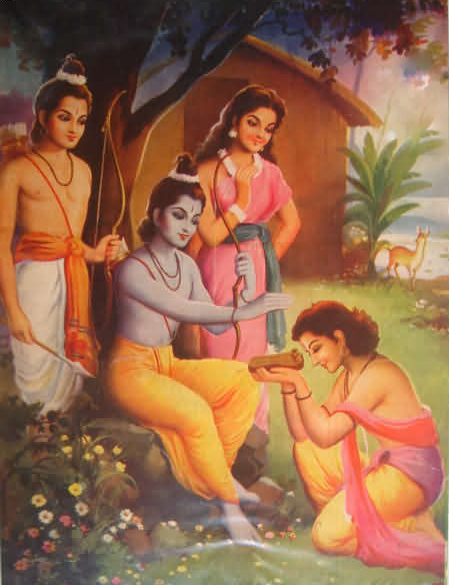Sloka #221
221. thApOdhgamasthvadhaBhiShEkajalapravAhai:
uthsArithasthvarithamuttharakOsalEBhya:
lEBhE chirAya raGhupungavapAdharakshE
lankAvarODhasudrushAm hrudayEShu vAsam
Meaning (translated by Sri. U.Ve. V.N. Vedanta Desikan)
Oh Paaduka! On the day, I believe, the floods of Your Abhisheka water drove the heart-burning, that the Kosala people had been till then tormented with, away to the hearts of Lanka womenfolk, and permanently to stay there too.
Special Notes from Sri. U.Ve. V. Sadagopan
1) Sri UtthamUr Swamy’s anubhavam: Oh PaadhukE ! The holy waters used for Your coronation rose with energy in the form of steam and entered the hearts of the women of the harem of RavaNA .Those waters (Taapam) left north Kosalaa and entered the hearts of the women of RaavaNA’s harem in the form of acute fear and anxiety .
2)Srimath Andavan’s anubhavam: Oh PaadhukE! They performed pattAbhishEkam for you with cool waters. When those waters fell on You, the pent-up taapams rose up from Kosala dEsam , reached LankA and settled down for long term residence in the hearts of the harem ladies .The inner meaning is that AzhwAr’s avathAram chased away the Kaamam , KrOdham et al and they had to go find another place to reside.
3) Until the PaadhukA pattAbhishEkam , there was a lot of sorrow( taapam ) in Kosala dEsam . Once the sacred waters fell on the Paadhukais , then those taapams left Kosala dEsam and found a new home in LankA ( the hearts of the queens of RaavaNA ). Swamy uses the word , ” uthsAritha:” to indicate that the taapams were chased away . What did those taapams do next? They found a home for long term residence in the hearts of the antha: pura sthrees ( avarOdha suddhrasAm hrudhayEshu chirAya vaasam lEbhE )…V.S
தாப உத்கம: த்வத் அபிஷேக ஜலப்ரவஹை:
உத்ஸாரித: த்வரிதம் உத்தர கோஸலேப்ய:
லேபே சிராய ரகு புங்கவ பாதரக்ஷே
லங்காவரோத ஸுத்ருசாம் ஹ்ருதயேஷு வாஸம்
பொருள் – பெரியபெருமாளின் திருவடிகளைக் காப்பாற்றும் பாதுகையே! உன் மீது பட்டாபிஷேகத்தின்போது சேர்க்கப்பட்ட புனித நீரானது, வடக்குக் கோஸலை நாட்டில் இராமனின் பிரிவால் ஏற்பட்டிருந்த தாபத்தைத் தீர்த்தது. பின்னர் அந்த வெள்ளம் அங்கிருந்து கிளம்பி, இலங்கையை அடைந்து, அங்குள்ள பெண்களின் மனதை அடைந்து, நீண்ட காலம் இருந்தது.
Sloka #222
222. Avarjitham viDhividhA maNipAdharakshE!
padmAsanapriyasuthEna purOhithEna
AsInnidhAnam aBhiShEkajalam thvadhIyam
nakthancharapraNayinInayanOdhakAnAm
Meaning (translated by Sri. U.Ve. V.N. Vedanta Desikan)
Oh Paaduka! The Abhisheka waters that were showered by the knowledgable Vasishta, son of Brahma, proved to be the cause of tears of the rakshasa women.
Special Notes from Sri. U.Ve. V. Sadagopan
1) Sri UtthamUr Swamy’s anubhavam : Oh PaadhukE ! VasishtA , the dear son of BrahmA is an expert in SaasthrAs .He collected in the traditional manner , all the holy waters and conducted Your coronation bath with them . After bathing You, those sanctified waters became the principal cause of the tears falling from the eyes of the consorts of RaavaNA and his generals. Swamy Desikan referred earlier to the coronation waters transforming to become acute fear and anxiety in the hearts of the consorts of RaavaNA ; here, he refers to their sorrow at seeing their husbands and sons slain by the arrows of RaamA and his army.
2) Srimath Andavan’s anubhavam:The wives of RaavaNA cried and shed copious tears , when the PaadhukAs received the consecrated PattAbhishEka Jalam on them from the hands of Sage VasishtA .
3) Swamy Desikan states that the carefully collected coronation waters used by the PurOhithA of the IshvAku family (Sage VasishtA) for PaadhukA abhishEkam became the cause for the tears of the consorts of RaavaNA ( tvadhIyam abhishEka jalam nakthanchara praNayinee nayanOdhakAnAm NIDHAANAM aaseeth).Nidhaanam means “kaaraNam ” or the reason …V.S
ஆவர்ஜிதம் விதிவிதா மணிபாதரக்ஷே
பத்மாஸந ப்ரியஸுதேந புரோஹிதேந
ஆஸிந்நிதாநம் அபிஷேக ஜலம் த்வதீயம்
நக்தஞ்சர ப்ரணயிநீ நயநோதகாநாம்
பொருள் – இரத்தினக்கற்கள் கொண்டு இழைக்கப்பட்ட ஸ்ரீரங்கநாதனின் பாதுகையே! அனைத்து சாஸ்திரங்களை அறிந்தவரும், நான்முகனின் ப்ரியமான புத்திரரும், குலகுருவும் ஆகிய வசிஷ்டர் மூலம், உன் மீது புனிதமான நீர் பட்டாபிஷேகத்தின்போது சேர்க்கப்பட்டது. இந்த நீரே, அரக்கர்களின் மனைவிகளின் கண்களில் இருந்து வெளிவரும் கண்ணீராக மாறியது.
Sloka #223
223. dhevi! thvayA snapanasampadhi samshrithAyAm
dhagDhE purE dashamuKhasya valimuKhEna
AsIth thatha: praBruthi vishvajanaprathItham
adBhyO agnirithyavithaTham vachanam munInAm
Meaning (translated by Sri. U.Ve. V.N. Vedanta Desikan)
Oh Devi! Even as the grand Abhisheka was performed in Your honour here, the land of Ravana was burnt by the monkey; thereafter it was recognized that Fire comes from water as rightly enunciated by sages to be accepted by all people.
Hanuman; ‘myself’ in humility, referred to in 3rd person by Hanuman in Sundarakanda
Vyasa in Mahabharata
Special Notes from Sri. U.Ve. V. Sadagopan
1)Sri UtthamUr Swamy’s anubhavam: Oh PaadhukE ! Oh Queen ! When You acquired the fame as a result of Your coronation , RaavaNA’s city was burnt to the ground by the monkey (Myself, HanumAn) . That event made true the Vedic words that fire resides/comes out of water.Thus, the holy waters of Your coronation became the fire that destroyed LankA .
2) Srimath Andavan’s anubhavam: Your pattAbhishEkam took place.HanumAn(myself) set fire to LankA .Then the world understood the veracity of the Vedic words revealed by sages that fire is born out of waters.
3) Swamy Desikan states that the power was acquired by the PaadhukA from the coronation bath in the consecrated waters prepared by VasishtA…VS
4) Swamy Desikan’s description of the PaadhukA pattAbhishEkam is reverential .He describes the event with nostalgia:” hEy dEvi ! thvayA snapana SAMPADHI samsrithA “. Sampadhi means wealth or Isvaryam .What happened from the acquisition of that wealth and sakthi (power)? The city of LankA was burnt down by HanumAn as a consequence of that power and potency . The Vedic revelation ( adhbhya Agni ithi) was made truthful and the citizens of the world understood that truth ( Visva Jana pprathItham aaseeth) from that day onwards..VS
தேவி த்வயா ஸ்நபந ஸம்பதி ஸம்ச்ரிதாயாம்
தக்தே புரே தசமுகஸ்ய வலீமுகேந
ஆஸித் தத: ப்ரப்ருதி விச்வ ஜந ப்ரதீதம்
அத்ப்ய: அக்நி: இதி அவிததம் வசநம் முநீநாம்
பொருள் – பாதுகாதேவியே! உனது பட்டாபிஷேகத்தின்போது சேர்க்கப்பட்ட புனித நீர் முதலானவை இலங்கைவரை சென்றது. இராவணனின் இலங்கை நகரம், அனுமனால் தீயிட்டு எரிக்கப்பட்டது. வேதங்களின் கூறப்பட்ட “நீரில் இருந்து நெருப்பு உண்டானது” என்னும் வரியானது, இந்த நிகழ்வுகள் மூலம் மக்களுக்குத் தெளிவாக உணர்த்தப்பட்டது.
Sloka #224
224. AyOdhyakaIsthvadhaBhiShEkasamiDdhaharShaI:
ADhmApithA: shruthisuKham nanu thE thadhAnIm
rAmasya rAkshasashirOlavanE apyashAmyan
yEShAm DhvanirvijayashamKharavO bhaBhUva
Meaning (translated by Sri. U.Ve. V.N. Vedanta Desikan)
At the time of Your Abhisheka the resounding sound that was produced by the delighted Ayodhya people, by blowing the conches in a sweet-to-the ear manner, was perhaps continuously heard, without subsiding, till the felling, by Rama, of the heads of Ravana,thus the sound turning out to be the Victory-Bugle!
Special Notes from Sri. U.Ve. V. Sadagopan
1) Sri UtthamUr Swamy ‘s anubhavam: Hail ! PaadhukE ! At the time of Your coronation , the citizens of AyOdhyA blew their conches in joy. A tumultous noise arose from their efforts to celebrate that joyous event. That gigantic sound did not die down; it reverberated in LankA as the sound of conches blown, when RaamA became victorious over RaavaNA by cutting down latter’s ten heads . Swami Desikan refers here to the general property of Sankha dhvani ( the sound of conch), which lasts for a long time after the conclusion of the blowing.
2) Srimath Andavan’s anubhavam:Oh PaadhukE! The sound of the Sankha-naadham created at the time of Your coronation lasted for a long time and was heard at quite a distance. That became the sankha-dhvani that arose during the occasion of the victory of RaamA over RaavaNA .That sound generated in AyOdhyA lasted until RaavaNA’s heads were cut .
3) Swamy Desikan connects here the sweet sound of the Conch blown by the Citizens of AyOdhyA –out of joy over the coronation of Sri Raama Paadhukais– to another sankha dhvani heard by the army of RaamA at the battle field in LankA , when He cut off the ten arrogant heads of RaavaNA .The distinction is made by Swamy Desikan between the two sounds arising from the conches at AyOdhyA and LankA . The one at AyOdhyA arose from the joy of the citizens and is described as “dhvani”. That dhvani was very pleasing to the ear ( Sruthimukham). The other one heard in LankA was majestic and the majesty of that sound is hinted by Swamy Desikan with the choice of the word “Rava:”, meaning a shreik, shrill sound or roar.That majestic sound was the announcer of RaamA’s victory over RaavaNA( Raamasya Vijaya Sankha rava:) and was pleasing to the ears in a different way ..VS
ஆயோத்யகை: த்வத் அபிஷேக ஸமித்த ஹர்ஷை:
ஆத்மாபிதா: ச்ருதி ஸுகம் நநு தே ததாநீம்
ராமஸ்ய ராக்ஷஸ சிர: லவநே அபி அசாம்யந்
யேஷாம் த்வநி: விஜய சங்க ரவ: பபூவ
பொருள் – ஸ்ரீரங்கநாதனின் பாதுகையே! உனது பட்டாபிஷேகத்தின்போது முழங்கப்பட்ட சங்குகளின் நாதம், அயோத்தி மக்களின் காதுகளில் இன்பமாகப் புகுந்து, அவர்களுக்கு பெரும் மகிழ்வு உண்டாக்கியது. ஆனால் அதே சங்குகளின் ஒலியானது, இராமன் அரக்கர்களின் தலையை அறுக்கும் காலம்வரை இலங்கையில் ஓயாமல் ஒலித்து நின்று, இராமனின் வெற்றியை அறிவிப்பதாக இருந்தன.
Sloka #225
225. praThayithum aBhiShEkam pAdhukE! thAvakInam
dhurithashamanadakshE dhundhuBhoU thAdyamAnE
sapadhi parigruhItham sADhvasam dhevi! nUnam
dashavadhanavaDhUnAm dhakshiNaIrnEthrakOshaI:
Meaning (translated by Sri. U.Ve. V.N. Vedanta Desikan)
Oh Paaduka Devi! the dundubhi drum was beaten loudly; it was a sin-removing event over all places; it caused great fear in the harem-women of Ravana, evident in their right eyes throbbing.
Special Notes from Sri. U.Ve. V. Sadagopan
1) Oh PaadhukE ! After the sound of conches subsided during the time of Your coronation , huge drums known as DhundhubIs were beaten in AyOdhyA .Giant reverbations from the beaten dhundhubhIs reached all the way to LankA ; immediately , the right eyes of the women of the harem of RaavaNA throbbed uncontrollably indicating impending disasters.
2) Srimath Andavan’s anubhavam: Oh PaadhukE! Skilled drummers beat on the huge drums at the conclusion of the blowing of the conches during your coronation. Simultaneously , the right eyelids of the wives of RaavaNA twitched uncontrollably.When the women’s right eye, thigh and hand throb , that is a sign of imminent inauspiciousness .
3)The huge drums beat to glorify the great occasion of the coronation of the PaadhukAs as well as to drive away any lingering sins .Dhundhubhis are known for creating such effects. In addition to these known effects, the gigantic sounds arising out of the dhundhubhis caused some thing else at the harems of RaavaNan at LankA. The eye lids of the wives of RaavaNA twitched uncontrollably at the same time , when the big drums sounded at AyOdhyA. The fear was generated in the hearts of the wives of RaavaNA about the imminent disaster to their status as sumangalis. Swamy Desikan states : Dasavadhana vadhUnAm dakshiNai: nEthrakOsai: saadhvasam parigruhItham ( The right eyes of the wives of RaavaNA twitched uncontrollably and acquired fear about impending disasater)…V.S
ப்ரதயிதும் அபிஷேகம் பாதுகே தாவகீநம்
துரித சமநதக்ஷே துந்துபௌ தாட்யமாநே
ஸபதி பரிக்ருஹீதம் ஸாத்வஸம் தேவி நூநம்
தசவதந வதூநாம் தக்ஷிணை: நேத்ர கோசை:
பொருள் – பாதுகாதேவியே! உன்னுடைய பட்டாபிஷேகம் பற்றி அனைவருக்கும் தெரியப்படுத்தவேண்டும் என்பதால், அயோத்தி முழுவதும் வாத்தியங்கள் முழங்கின. இவை மூலம் அனைத்து இடங்களிலும் உள்ள பாவங்கள் அகன்றன. இலங்கையில் உள்ள இராவணனின் மனைவிமார்களுடைய வலது கண்கள் அந்த ஒலிக்கேற்றாப்போல் துடித்தபடி நின்றன (பெண்களின் வலது கண் துடிப்பது தீமைக்கு அறிகுறி என்று கருத்து).
Sloka #226
226. raGhupathipadharakshE! rathnapITE yadhA thvAm
aKhilaBhuvanamAnyAm aBhyaShinchath vasiShta:
dashamuKhamahiShIBhirdhevi! bAShpAyithABhi:
sthanayugamaBhiShEkthum thathkshaNAdhanvamamsThA:
Meaning (translated by Sri. U.Ve. V.N. Vedanta Desikan)
Oh Rama-Paaduka! Even as Vasishta performed the Abhishekam for You, who are respected all over the worlds, placing You in a gem-studded throne, You had perhaps caused the ‘abhisheka,’ of the breasts with tears of grief in the case of the queens of Ravana.
Special Notes from Sri. U.Ve. V. Sadagopan
1) Sri UtthamUr Swamy’s anubhavam:Oh Queen! Oh Raama PaadhukE ! At the same moment , when Sage VasishtA seated You on the throne of the Raghus and conducted Your abhishEkam (coronation bath) , there started another bath in the harem of RaavaNA . That bath consisted of the bathing of the breasts of RaavaNA’s wives with their copious tears about their fate.
2) Srimath Andavan’s anubhavam: Oh PaadhukE! At the same time, when Sage VasishtA performed Your pattAbhishEkam , You ordered the wives of RaavaNA to commence their weeping over their forthcoming misfortunes. The inner meaning is that the dhurvritthis ( bad behaviors ) of the IndhriyAs died , when Swamy NammAzhwAr incarnated on this earth.
3) Swamy Desikan salutes the Raama Paadhukais affectionately as : ” Akhila bhuvana maanyAm ” ( the most revered one in all the worlds). He says further that the Paadhukais gave the order( anvamamstha:) for the wives of RaavaNA (Dasamukha- mahishIbhi:) to commence drenching/bathing (abhishEkthum) their two breasts (sthana yugam)with their tears at the same time , they (the Paadhukais) had the coronation bath …V.S
ரகுபதி பதரக்ஷே ரத்நபீடே யதா த்வாம்
அகில புவந மாந்யம் அப்யஷிஞ்சத் வஸிஷ்ட:
தஸமுக மஹிஷீபி: தேவி: பாஷ்பாயிதாபி:
ஸ்தநயுகம் அபிஷேக்தும் தத் க்ஷணாத் அந்வமம்ஸ்தா:
பொருள் – ரகு குலத்தின் நாயகனான இராமனின் திருவடிகளைக் காப்பாற்றும் பாதுகாதேவியே! அனைத்து உலகங்களும் போற்றும்படியான தகுதி உள்ளவள் நீ ஆவாய். இப்படிப்பட்ட உன்னை வசிஷ்டர் இரத்தினக்கற்களால் இழைக்கப்பட்ட ஸிம்ஹாஸனத்தில் அமர வைத்து, பட்டாபிஷேகம் செய்து வைத்தார். அந்த நேரத்திலேயே இராவணனின் மனைவிமார்களின் கண்ணீர், அவர்களின் ஸ்தனங்களை நனைத்தபடி நின்றன.
Sloka #227
227. ramAsthrANi nimitthamAthramiha thE labDhABhiShEkA svayam
rakshasthath kshapayAmchakAra BhavathI BhadrAsanasThAyinI
yaddhOShNAm athivEladharpadhavaThujvAlosHmalAnAm thadhA
niShpiShtaI: kalaDhoUthashaIlashiKharaI: karpUrachUrNAyitham
Meaning (translated by Sri. U.Ve. V.N. Vedanta Desikan)
Oh Paaduka! You having Yourself achieved, even at the very moment of Your coronation, being seated on the auspicious Simhasana throne, the complete annihilation of that Rakshasa, Ravana, whose ‘might of the arm’ could be imagined from his inability to contain muscle-fat-strength unless he grinds to Karpoora-like powder the silvery Kailasa mountain in the heat of hand-pulverizing in a fierce temper. The arrows of Rama were but mere pretexts in the matter of the killing of Ravana.
Special Notes from Sri. U.Ve. V. Sadagopan
1) Sri UtthamUr Swamy’s anubhavam: This is the last verse through which Hanumaan offers his salutations to the PaadhukAs. He says: ” Oh PaadhukE ! RaavaNA once shook up and pulverized the peaks of KailAsA with his mighty arms. You destroyed that powerful RaavaNA from far away (from AyOdhyA ), soon after Your coronation , while You were still seated on the auspicious throne of the Raghus. RaamA’s arrows aimed at RaavaNA were only a pretext . Indeed , it was You , who eliminated RaavaNA . All that RaamA did in the battle field was due to Your power and glory.
2) Srimath Andavan’s anubhavam: The power-conscious and egotistic RaavaNA shook the KailAsA mountain , the abode of Lord ShivA. At that time , the peaks of that holy mountain got pulverized . Oh PaadhukE ! You destroyed that mighty RaavaNA from Your auspicious throne in AyOdhyA. RaamA’s arrows were in name only. It was You who were instrumental in RaavaNA’s death.The inner meaning is that it is the AchAryAs , who save the Jeevans , while outwardly it is understood that it is the Lord , who saves them.
3) Swamy Desikan salutes the Sacred Paadhukais of RaamA seated on the auspicious family throne ( BhadhrAsanasThAyinee). He says : ” RaamA’s arrows in the matter of killing RaavaNA were only a pretext (VyAjam , nimitthamAthram).You by Yourself were the cause of RaavaNA’s destruction (Svayam tath raksha: kshapAmchakara) …V.S
4)Swamy Desikan’s evocation of the imagery of the egotistic RaavaNA lifting the KailAsa parvatham and causing damage to the peaks of that snowy mountain abode of Lord SivA is beautiful . First Swamy Desikan decribes the hot hands of RaavaNA burning with the limitless heat of ego as ” athivEla dharpa dhavadhu jwAlA ushmANam yaddhOshNAm “. What happened next is described as : ” nishpishtai: kaladhoutha saila sikharai: tadhA karpUrachUrNAyitham “. The peaks of that silver mountain ( covered with silvery snow) got pulverized and fell around like the rain of camphor powder . The analogy of the snow clad mountain breaking up and falling apart as the rain of powdered camphor is a testament to the poetic genius of our dear AchAryan ..V.S
ராம அஸ்த்ராணி நிமித்த மாத்ரம் இஹ தே லப்த அபிஷேகா ஸதீ
ரக்ஷ: தத் க்ஷபயாஞ்சகார பவதீ பத்ர ஆஸநஸ்தாயிநீ
யத்தோஷ்ணாம் அதிவேல தர்பதவது ஜ்வாலா ஊஷ்மளாநாம் ததா
நிஷ்பிஷ்டை: கலதௌதசைல சிகரை: கர்ப்பூர சூர்ணாயிதம்
பொருள் – நம்பெருமாளின் பாதுகையே! இராவணனின் புஜங்கள் இரண்டும் அக்னியின் ஜ்வாலை போன்று இருந்தன. அவன் கைலாய மலையை அப்படிப்பட்ட புஜங்களால் உயர்த்தியபோது, தீயில் இட்ட கர்ப்பூரம் போன்று, கைலாய மலையின் சிகரங்கள் பொடியாகிவிட்டன. இப்படிப்பட்ட வலிமை உடைய இராவணனை இராமன் தனது அஸ்திரம் மூலம் அழித்தான் என்பது பெயரளவில் மட்டுமே! உண்மையாக நடந்தது என்ன? ஸிம்ஹாஸனத்தில் அமர்ந்தபடி நீயல்லவா இராமனின் பாணங்கள் கொண்டு இராவணனை அழிந்தாய்?
Sloka #228
228.shruthvaIvam hanumanmuKhAdh raGhupathE: prathyAgathim thathkshaNAdh
AsIdhadhBharathAnuvarthanavashAdh ARudAkumBhasThalAm
kAlOnnidhrakadhuShNadhanamadhirAmAdhyadhdhvirEphaDhvani-
shlAGhachAtuBhirasthuthEva BhavathIm shatrunjaya: kunjara:
Meaning (translated by Sri. U.Ve. V.N. Vedanta Desikan)
Oh Paaduka! On hearing from Hanuman that Sri Rama was returning, Bharata quickly started to receive Him. He placed You on the royal elephant, Satrunjaya, and proceeded; the elephant, in its delight, secreted slightly hot ichor; the bees that fed on it and got fat with it were singing, as if in Your praise.
Special Notes from Sri. U.Ve. V. Sadagopan
1) Sri UtthamUr Swamy’s anubhavam: After hearing from HanumAn about the return of RaamA to AyOdhyA , BharathA placed with respect the PaadhukAs on the back of the royal elephant, Satrunjaya , and followed the Paadhukais . The journey was from Nandigraam to AyOdhyA . Swamy Desikan describes the happy state of mind of the royal elephant , while performing the pleasant task of carrying the holy PaadhukAs on its back. Swamy Desikan says that the royal elephant got excited and reached a state of rut and warm fluid associated with that state began to flow from its eyes. The bees were attracted by the perfume of that fluid and began to circle the elephant’s head. The sound that the bees generated during that time appeared like the salutations to the Raama Paadhukais.
2) Srimath Andavan’s anubhavam: Oh PadhukE ! HanumAn brought the message to BharathA that Sri Raamachandran was hastening towards AyOdhyA after His victory over RaavaNA at LankA. Bharathan was ecstatic over the news and wanted to unite You with Your Lord.You accepted BharathA’s request to enter AyOdhyA with pomp and cermony on the back of the royal elephant for Your reunion. The royal elephant that carried You on its back shed hot ichor from its eyes. The bees enjoyed feeding on the hot ichor and sounded with joy . The reenkAram of the dhvirEpams (bees) sounded like prayerful songs in Your praise.
3) Here Swamy uses the word “dhvirEpam ” to refer to the bees , whose other name is Bhramaram. Since there are two “r” s in the word denoting bees (Bhramaram), the other name of DhvirEpam for bees originated.DhvirEpam also means Vedam . The scene looked like the Veda AdhyApakar ( the teacher of VedAs , Swamy NammAzhwAr ) was sitting on the VedikA ( the raised seat , the elephants’ back) and the students (bees) were performing adhyayanam (the recital of the VedAs ). Swamy nammAzhwAr is the author of the Tamizh maRais (VedAs ). Thus with Veda ghOsham , the procession of the SatAri Soori on the back of the royal elephant proceeded to AyOdhyA to welcome the victorious return (prathyAgathi )of Lord RaamachandrA..V.S
4) The hot ichor that flowed form the eyes on to the cheeks of the royal elephant was like hot toddy ( kadhushNa dhAana madhirA ). The bees (dhvirEpa:) tasted it and got intoxicated and began to generate joyous sounds that resembled sweet Vedic adulations for the Paadhukais (dhvirEpa dhvani slAgachADubhi: asthutEva )…V.S
ச்ருத்வா ஏவம் ஹநுமந் முகாத் ரகுபதே: ப்ரத்யாகதிம் தத் க்ஷணாத்
ஆஸீதத் பரத அநுவர்த்தன வசாத் ஆரூட கும்பஸ்தலாம்
கால உந்நித்ர கதுஷ்ண தாந மதிரா மாத்யத் த்விரேப த்வநி
ச்லாகாசாடுபி: அஸ்துதேவ பவதீம் சத்ருஞ்ஜய: குஞ்ஜர:
பொருள் – பாதுகையே! இராமனின் வருகை குறித்து அனுமன் மூலமாகப் பரதன் அறிந்து கொண்டான். இந்தச் செய்தியை உன்னிடம் கூறிய பரதன், நீ உடனே இராமனிடம் எழுந்தருளவேண்டும் என்று விண்ணப்பம் செய்தான். இதனைக் கேட்ட நீ, உடனே பட்டத்து யானை மீது அமர்ந்தாய். நீ அமர்ந்தவுடன் அந்த யானைக்கு ஏற்பட்ட மகிழ்வு காரணமாக மெதுவான உஷ்ணத்துடன் கூடிய மதநீர் பெருகியது. அந்த மதநீரில் வந்து அமர்ந்த வண்டுகள் பெரும் ரீங்காரம் செய்தன. இதனைக் காணும்போது யானை உன்னைத் துதித்தது போன்று காணப்பட்டது.
229. prathyAgathasya BhavathIm avalOkya Bharthu:
pAdhAravindasaviDhE BharathOpanIthAm
pUrvABhiShekaviBhavABhyuchithAm saparyAm
maDhyE sathAm akrutha maIthilarAjakanyA
Meaning (translated by Sri. U.Ve. V.N. Vedanta Desikan)
Oh Paaduka! Sita was observing You being brought by Bharata near the lotus feet of Rama. She felt that she should pay homage to You for being the first to receive the coronation. She accordingly paid her respects to You in the presence of the elders.
Special Notes from Sri. U.Ve. V. Sadagopan
1) Sri UtthamUr Swamy’s anubhavam: Here Swamy Desikan refers to SitA Devi’s salutations to Her husband’s Paadhukais that had ruled AyOdhyA for fourteen years. She was travelling at the time towards AyOdhyA in the Pushpaka VimAnam and saw the procession of the Paadhukais towards AyOdhyA on the royal elephant’s back. She offered Her worship , since the PaadhukAs had been consecrated by Sage VasishtA and others through the coronation bath and subsequent ceremonies for becoming the ruler of the KosalA nation. She offered Her worship to the present ruler.
2) Srimath Andavan’s anubhavam: Oh PaadhukE ! BharathAzhwAn presented the Paadhukais to Your Lord on His victorious trip to LankA. SitA PirAtti offered Her salutations to You in the middle of the Raaja Sabhai , since You have already been coronated by Sage VasishtA as the reprensative of RaamA to rule the kingdom.
3) Mythila Raaja KanyA (SitA PirAtti) glanced at Her Lord’s Paadhukais , which were placed by BharathAzhwAn with reverence near the lotus feet of Her Lord , who had returned to AyOdhyA as a victor ( PrathyAgathasya Bharthu: Paadaaravindha savidhE , Bharatha upaneetham BhavathIm avalOkya).She immediately recognized the Vaibhavam of the Paadhukais as those , which have already been consecrated with PattAbhishEkam by the Kula Guru, VasishtA and hence performed Her PoojA to them in an appropriate manner in front of all the great ones assembled in the court hall ( PoorvAbhishEkaka Vibhava abhyuchitham saparyAm sathAm madhyE akrutha)…V.S
ப்ரத்யாகதஸ்ய பவதீம் அவலோக்ய பர்த்து:
பாதாரவிந்த ஸவிதே பரதோபநீதாம்
பூர்வ அபிஷேக விபவ அப்யுசிதாம் ஸபர்யாம்
மத்யே ஸதாம் அக்ருத மைதிலராஜகன்யா
பொருள் – பெரியபெருமாளின் பாதுகையே! இராமன் அயோத்தி திரும்பியவுடன் அவனுடைய தாமரை போன்ற அழகான திருவடிகளின் அருகே பரதன் உன்னைச் சமர்ப்பணம் செய்தான். தனது கணவனான இராமனின் திருவடிகளின் அருகில் வைக்கப்பட்ட உன்னை ஜனகனின் மகளான சீதை பார்த்தாள். இராமனுக்கு முன்பாகவே பட்டாபிஷேகம் செய்விக்கப்பட்ட உன்னைப் பெருமையுடன் கண்ட அவள், அங்கிருந்த அனைத்துப் பெரியவர்களும் பார்த்து நிற்க, உனக்கு ஏற்ற மரியாதைகளைச் செய்தாள் (சீதையும் பாதுகையும் இராமனைச் சேர்ந்தவர்கள் என்றாலும், சீதைக்கு முன்பாக பாதுகைகள் ஸிம்ஹாஸனத்தில் அமர்ந்ததால் பாதுகைக்கு ஏற்றம் அதிகம். ஆகையால் சீதை வணங்கினாள் என்று கருத்து).
Sloka #230
230. samprEkshya maIThilasuthA maNipAdharakshE!
prathyugdhathasya BhavathIm Bharathasya moUloU
nirdhishya sA niBhrutham anjalinA purasthAth
thArAdhikA: priyasaKhI: ashiShath praNanthum
Meaning (translated by Sri. U.Ve. V.N. Vedanta Desikan)
Oh Manipaaduka Devi! Sita saw You on Bharata’s head as he was proceeding towards Sri Rama to receive Him. She did not open her mouth to speak anything, but in a silent manner, she directed her supplicated-hand towards You, seeing Tara and other lady-companions, thereby enjoining them to pay their respects to You.
Special Notes from Sri. U.Ve. V. Sadagopan
1) Sri UtthamUr Swamy’s anubhavam: Oh Gem-decked PaadhukE ! When SitA Devi saw You approaching Her and RaamA , while seated on Bharathan’s head ,She stood immobile and humbly folded her hands in salutation to You. She also instructed Her dear friends like TarA to offer their own salutations to You.
2) Srimath Andavan’s anubhavam: When SitA saw You being brought on the head of BharathA towards Her Lord , she pointed You with anjali mudhrA to Her dear friends and directed them to offer their salutations as well.
3) Swamy Desikan states that our ThAyAr saw the Paadhukais on the head of BharathA ( MythilisuthA BhavathIm Bharathasya mouLE samprEkshya). Not only did our ThAyAr see the worshipful Paadhkais , but she also pointed them out reverentially to He rpriya sakhis and directed them to offer their own salutations ( anjalinA nirdhisya –priyasakhI: praNanthum asishath ) . She folded Her hands first with out any hesitation (purasthAth nibhrutham anjalinA nirdhisya) and with the folded palms pointed the Paadhukais to TaarA and other dear friends and suggested to them to offer their own vandhanams …V.S
ஸம்ப்ரேக்ஷ்ய மைதிலி ஸுதா மணிபாதரக்ஷே
ப்ரத்யுத்கதஸ்ய பவதீம் பரதஸ்ய மௌளௌ
நிர்திச்ய ஸா நிப்ருதம் அஞ்ஜலிநா புரஸ்தாத்
தராதிகா: ப்ரியஸகீ: அசிஷத் ப்ரணந்தும்
பொருள் – இரத்தினக்கற்களால் இழைக்கப்பட்ட பாதுகையே! இராமன் முன்பாக பரதன் உன்னைத் தனது தலையில் எழுந்தருளிப் பண்ணிக்கொண்டு வந்தான். இதனைப் பார்த்த சீதை தனது கைகள் குவித்து உன்னை வணங்கி, தனது கண் ஜாடை மூலம் தன் தோழிகளான தாரை போன்றவர்களையும் உன்னை வணங்குமாறு கூறினாள்.
English Source Text: sundarasimham.com
Tamil Source Text: namperumal.com














